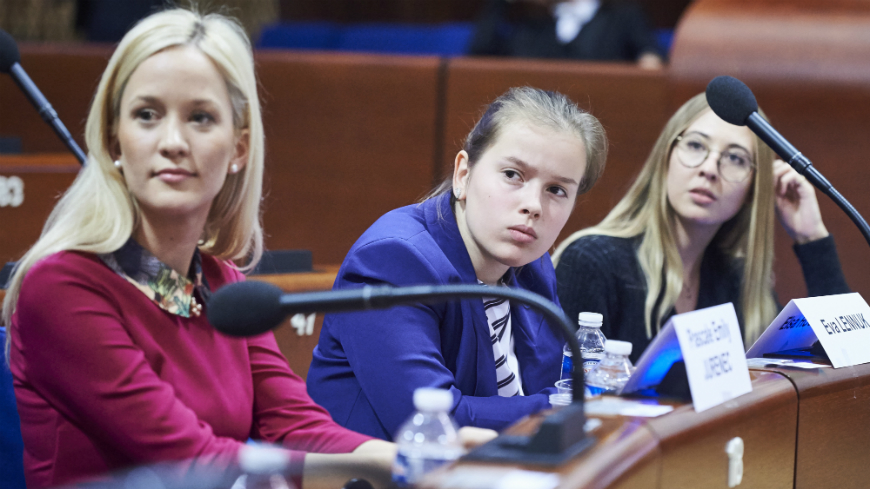Young people's participation is vital for the development of European local democracy. The Congress invited its youth delegates to present the projects they carried out in 2018, along with their observations and recommendations. As well as directly affecting more than 5 000 Europeans, these 42 projects highlighted a number of common concerns: young people's access to information and to institutions, intercultural dialogue, the funding of initiatives and tangible measures to include young people in the work of local elected representatives.
Through their projects the youth delegates aimed to provide a practical response to the question how to reach out to young people and motivate them to take part in local government.
For example, in Ireland Rhona CONWAY-KENNY created a blog where local councillors answered questions of direct relevance to the lives of young people. In Poland Bartłomiej SORDYL organised meetings with upper secondary school students to present a range of institutional opportunities for creating, conducting and defending initiatives concerning democracy and human rights. Referring to several initiatives in the field of access to information, the Swedish youth delegate Elsa HÖÖK underlined the importance of the message conveyed by the Congress to young Europeans: “These documents need to be easier to understand and access, particularly through the addition of new audio-visual formats.”
Starting from the observation that there was still far too little youth involvement in local democracy, Estonia’s youth delegate Eva LENNUK encouraged delegations to increase the number of initiatives in each country. At the very least, such initiatives required a three-pronged approach: creating a sense of well-being and togetherness, promoting access to clear and precise information and ensuring elected representatives take youth initiatives seriously. Together with youth organisations in Ukraine, Lithuania and Latvia, she carried out a project called “The Happiness Epidemic”, which aimed to present young people with tools and opportunities that could help them appreciate the advantages of belonging to a community. With this in mind, she also cited the project run by Larissa KENNEDY (United Kingdom): a series of workshops to raise awareness of issues confronting local communities.
Finally, Slovenia’s youth delegate Pascale Emily JURENEC highlighted the importance of civic education so as to provide young people with information not only about their rights, which the Council of Europe defends, but also about their civic responsibilities. Intercultural dialogue, particularly between young citizens, was crucial in the current migration crisis, she said. This was the driving force behind a series of projects aiming to foster the integration of young migrants. They included the following projects: “MyBuddy” a project run by Weihua WANG (Germany), which sought to set up friendship pairs between teenage Germans and refugees in the same age group; the seminars on the concept of intercultural dialogue organised by Assya PANDZHAROVA (Bulgaria); and the project implemented by Deedeni DEVOS (Belgium) entitled “Ulysses of a Multicultural European Youth”.
The youth delegates, whose presentations were applauded by the entire Congress, also received the staunch support of a number of Congress members who stressed the need to do more to involve young people in the work of the national delegations and particularly to take concrete action in order to help them finance and conduct their projects. The Estonian youth delegate Eva LENNUK responded by calling on the Congress to take the plunge and invite youth delegates to participate not just as observers, but also as political contributors at local and regional level.
- Mediabox interviews with Pascale-Emilie Jurenec and Eva Höök
- Video of the debate
- More information about youth delegates
** 35th Session of the Congress **




